Retro Replay Review
Gameplay
Ports of Call places you in the captain’s chair of your very own shipping empire. From the outset, you select your hometown and make your first investment in a second-hand vessel. This initial decision shapes your starting capital and influences the types of cargo contracts available to you. As you charter freight, the game challenges you to weigh costs, travel distance, and market fluctuations to turn a tidy profit.
(HEY YOU!! We hope you enjoy! We try not to run ads. So basically, this is a very expensive hobby running this site. Please consider joining us for updates, forums, and more. Network w/ us to make some cash or friends while retro gaming, and you can win some free retro games for posting. Okay, carry on 👍)
As profits roll in, you’ll reinvest in newer, larger ships, expanding your fleet and opening up high-value trade routes. Yet with expansion comes responsibility: every vessel requires routine maintenance to avoid mechanical failures. The tension of balancing repair costs against potential earnings creates a constant undercurrent of risk and reward, keeping each voyage engaging and meaningful.
Ports of Call spices up the business simulation formula with action sequences that break the monotony of spreadsheet-style trading. You’ll manually steer your ship into tight harbor entrances, testing your sense of timing and spatial awareness. In rescue missions, you navigate choppy seas to reach stranded sailors, adding an adrenaline rush to your otherwise methodical career.
The game also supports up to four players on a single computer, turning your shipping adventures into a competitive or cooperative hotseat affair. Whether you’re vying for the biggest cargo contracts or teaming up to tackle a massive rescue, the multiplayer mode adds a social layer to the core trading mechanics that can spark laughter, rivalry, and shared triumphs around any desk.
Graphics
Visually, Ports of Call leans into a functional, minimalist aesthetic reminiscent of classic German business simulators. Ships, ports, and cargo icons are rendered in simple 2D sprites that prioritize clarity over flashy detail. While the graphics may feel dated by modern standards, they convey necessary information—such as ship health, speed, and cargo capacity—at a glance.
During port entry and rescue sequences, the game switches to a basic side-view perspective that emphasizes the practical challenge of navigation. Waves are depicted with simple patterns, and your ship’s motion is smooth enough to allow precise steering. Though there are no advanced lighting effects or high-resolution textures, the animations are consistent and free of jarring glitches.
The user interface is clean and menu-driven, with straightforward tabs for fleet management, market data, and repair facilities. Charts and tables display essential statistics without overcrowding the screen. Even veteran sim-players will appreciate the no-nonsense design that focuses attention on decision-making rather than visual spectacle.
For those who enjoy retro gaming or have nostalgia for early simulators, Ports of Call’s graphics package offers a certain charm. It stands as a reminder of an era when gameplay depth far outweighed graphical fidelity. If you prefer sleek, modern visuals, this title might not meet your aesthetic expectations—but its clear presentation supports long hours of strategic gameplay without eye strain.
Story
Ports of Call does not present a scripted narrative or elaborate character arcs; instead, it crafts an emergent story driven by your choices at sea. Each voyage becomes a chapter in your own shipping saga, shaped by market booms, unexpected storms, and the occasional rescue mission. The lack of a forced storyline allows you to set your own goals and define what success means for your fleet.
Your journey begins in a hometown of your choosing, which subtly influences initial cargo options and the types of ports you’ll visit. Over time, you’ll encounter new harbors in different climates, adjusting to varying fees, local demand, and weather conditions. This evolving trade network creates a living backdrop for your rise from humble beginnings to maritime magnate.
Rescue missions and action segments inject little bursts of drama that contrast with the steady rhythm of trade negotiations. Saving shipwrecked sailors doesn’t just boost your reputation—it generates memorable moments you’ll recount to friends. These vignettes, while mechanically simple, add emotional stakes to your captain’s log.
Ultimately, the story of Ports of Call is yours to write. Whether you chase aggressive expansion, focus on niche cargo specialties, or prioritize humanitarian missions at sea, the game responds to your ambitions. The absence of a predefined plot may feel sparse to narrative-driven gamers, but for strategy enthusiasts, this open canvas invites endless creative play.
Overall Experience
Ports of Call excels as a deep, strategy-heavy business simulation with a dash of action. The core loop of buying ships, securing freight, navigating routes, and managing repairs offers a satisfying progression that can engross players for dozens of hours. Its straightforward mechanics invite experimentation, while the financial risk keeps stakes high throughout your maritime career.
However, the game’s dated presentation and lack of tutorial guidance can pose a steep learning curve for newcomers. Without handholding, early voyages may feel punitive if you overlook repair schedules or misread cargo markets. Patience and a willingness to learn through trial and error are essential to mastering the simulation.
The local multiplayer mode shines by transforming long trading sessions into a lively social experience. Sharing one computer with up to four captains in hotseat style leads to friendly rivalries over the most lucrative routes or bragging rights for daring rescue runs. It’s a throwback to couch-cooperative gaming that feels refreshing in an era of isolated online play.
In sum, Ports of Call stands as a niche classic that rewards strategic thinking, risk management, and a taste for retro simulation. While its visuals and interface may not impress everyone, the depth of its economic engine and the thrill of manual navigation sequences ensure a uniquely engaging voyage. If you’re seeking an old-school shipping sim with room for personal storytelling and multiplayer fun, Ports of Call is well worth the trip.
 Retro Replay Retro Replay gaming reviews, news, emulation, geek stuff and more!
Retro Replay Retro Replay gaming reviews, news, emulation, geek stuff and more!
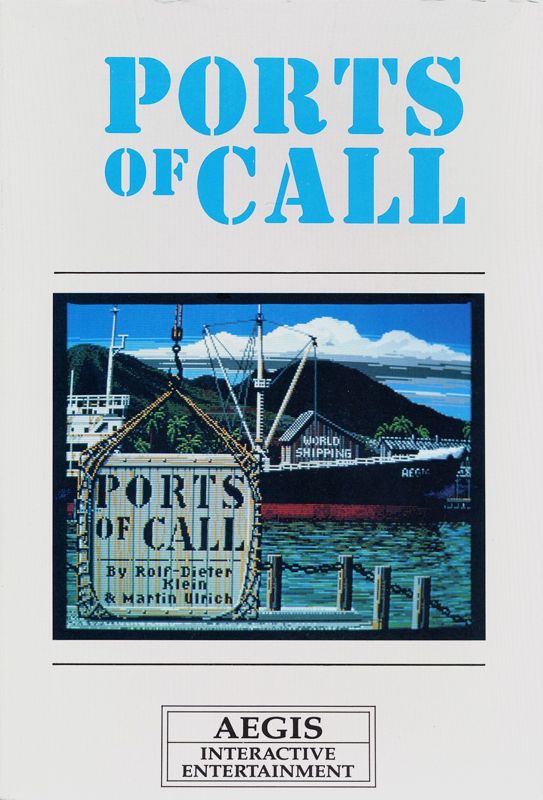
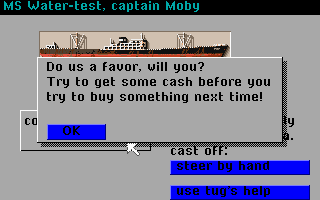
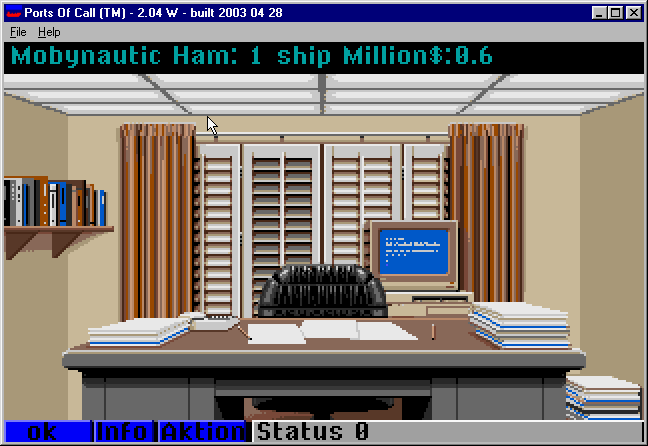
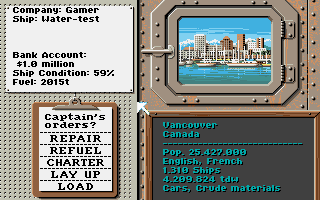
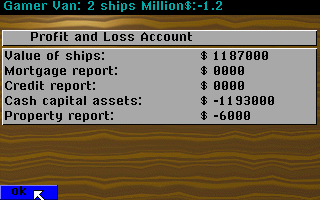

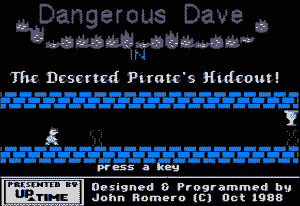

Reviews
There are no reviews yet.